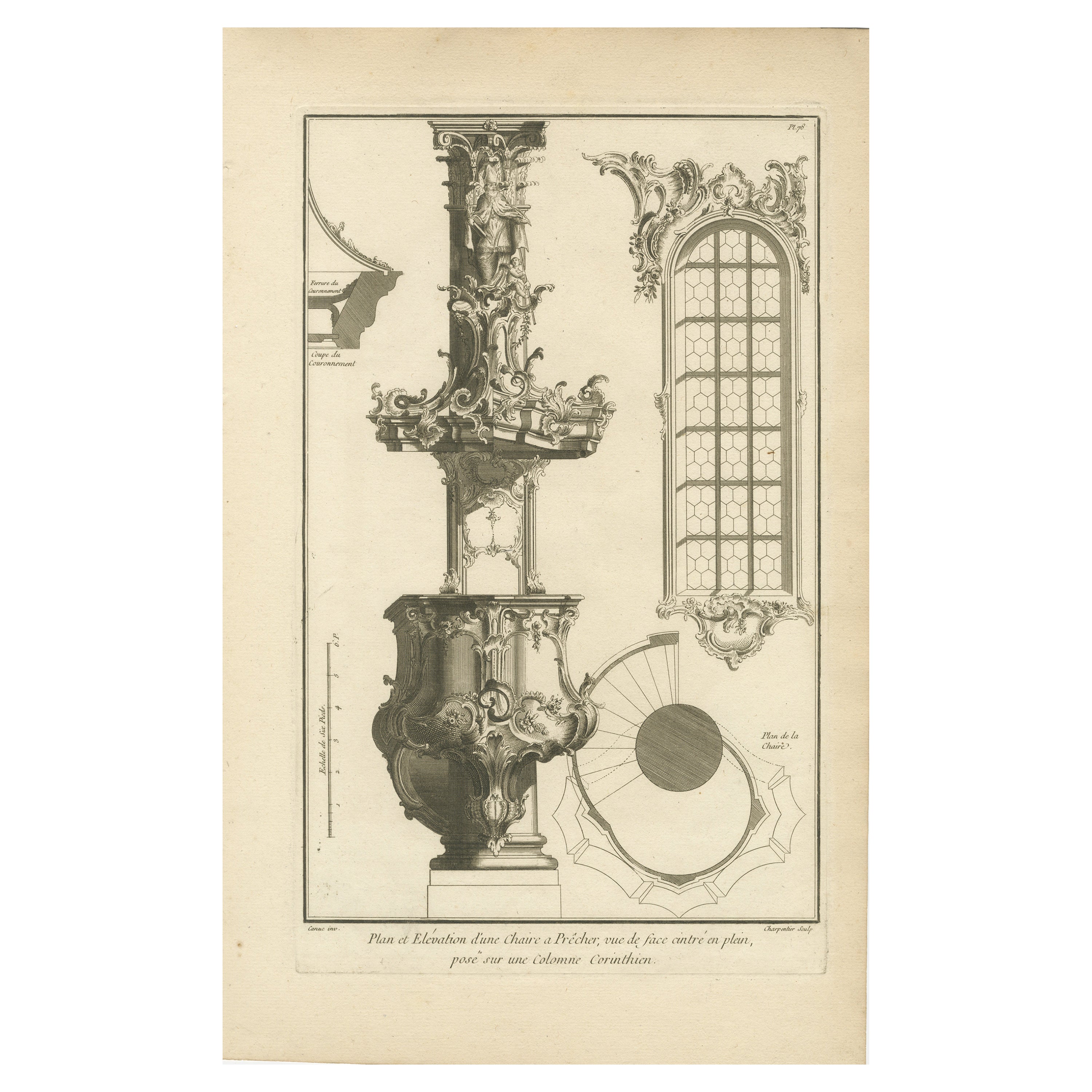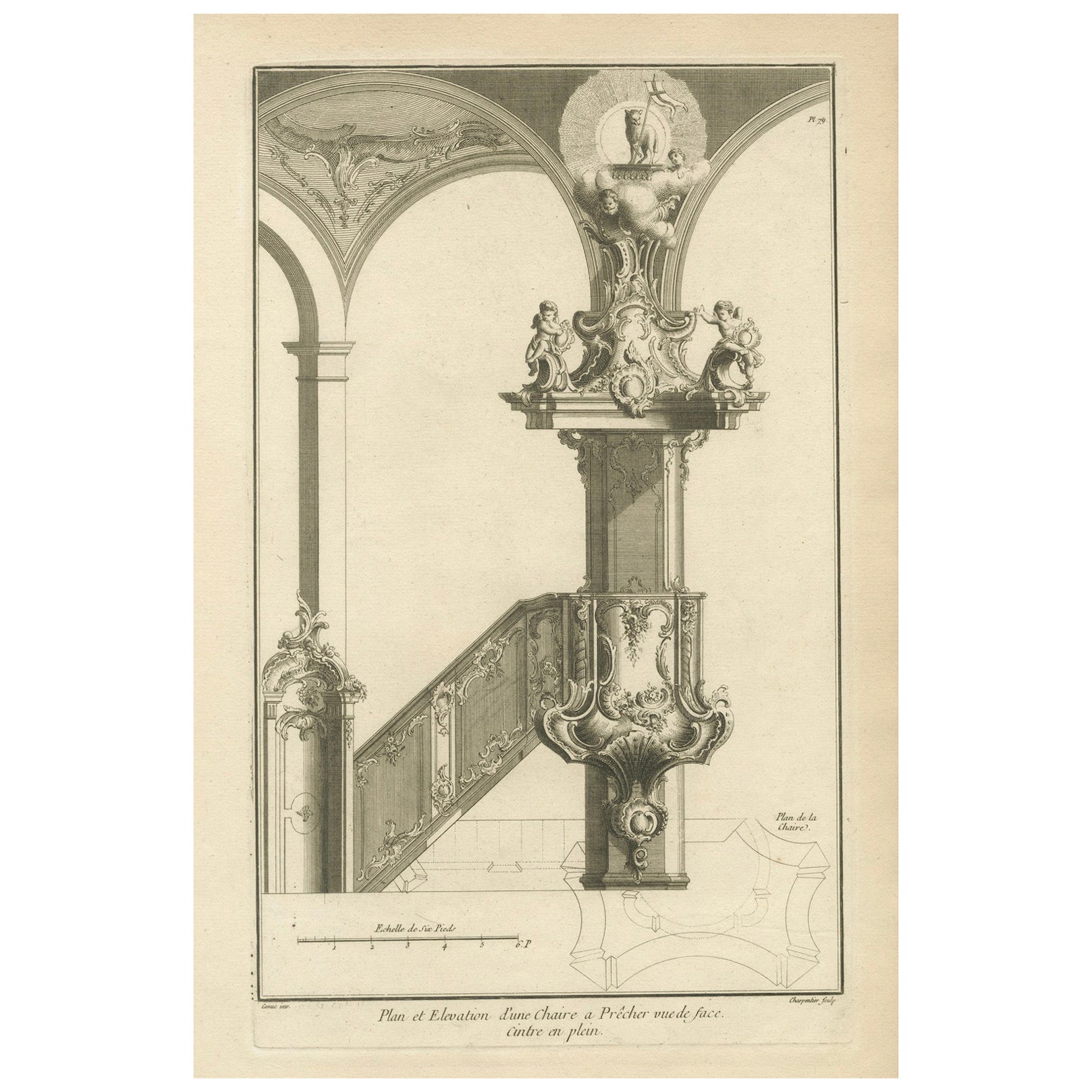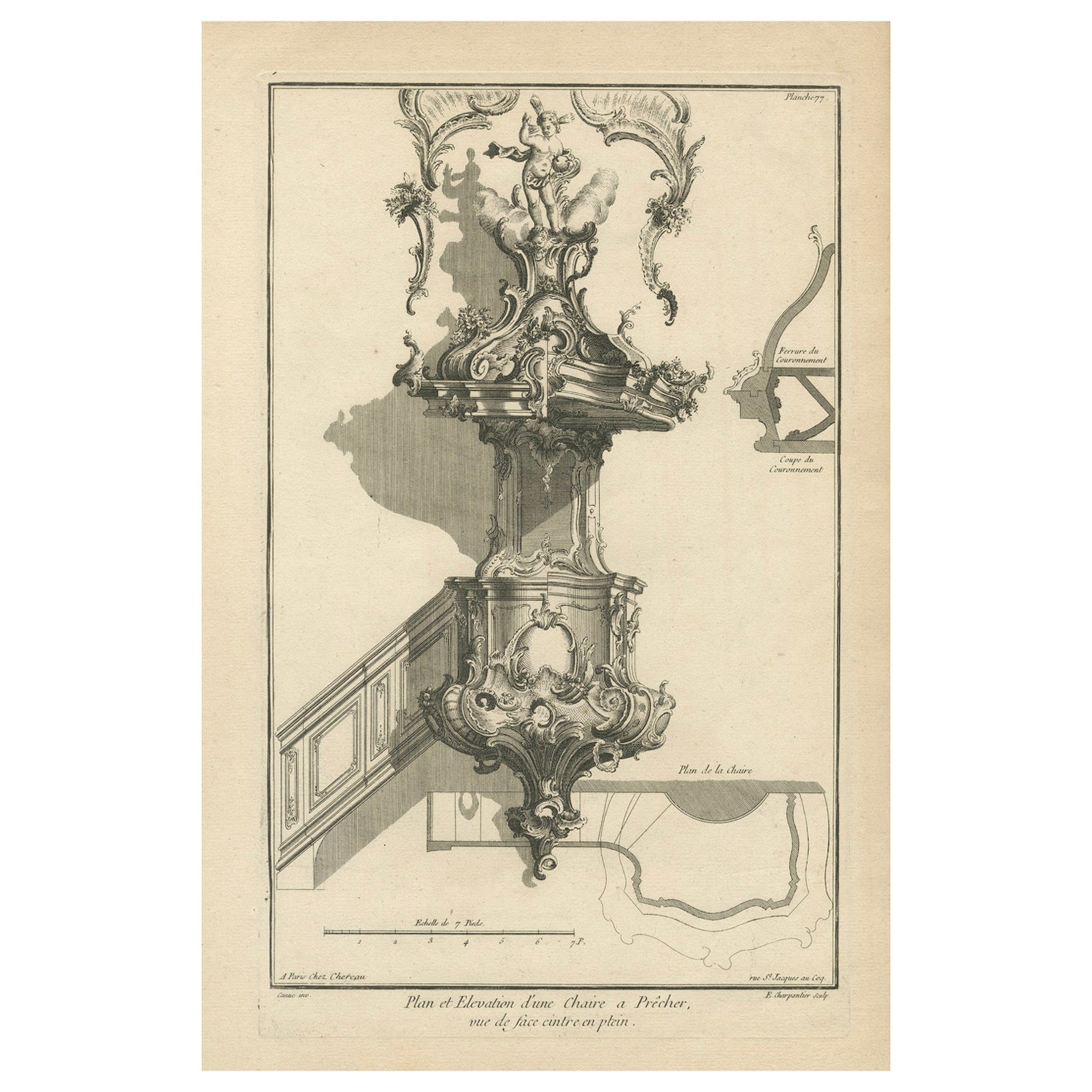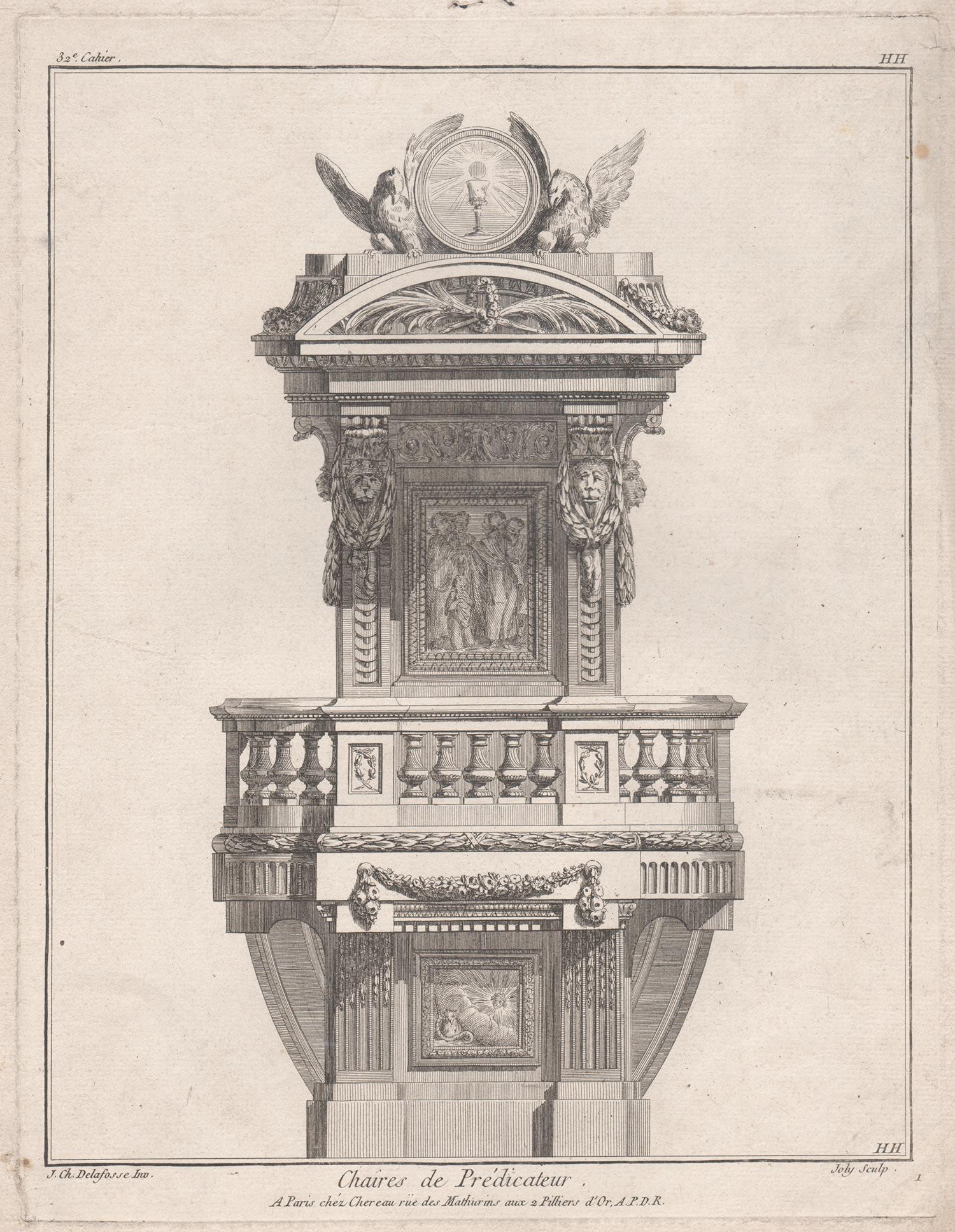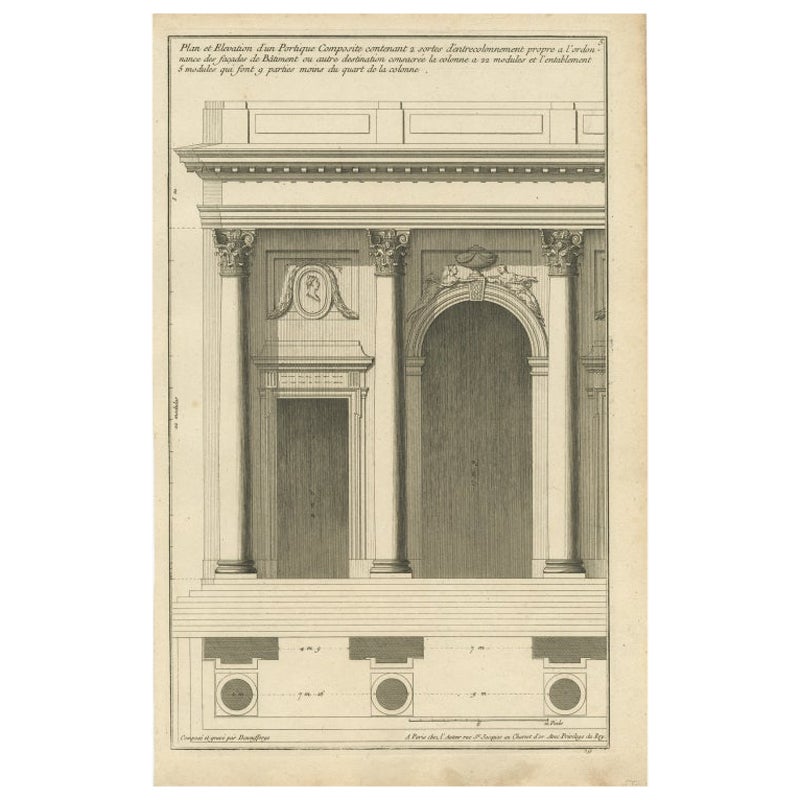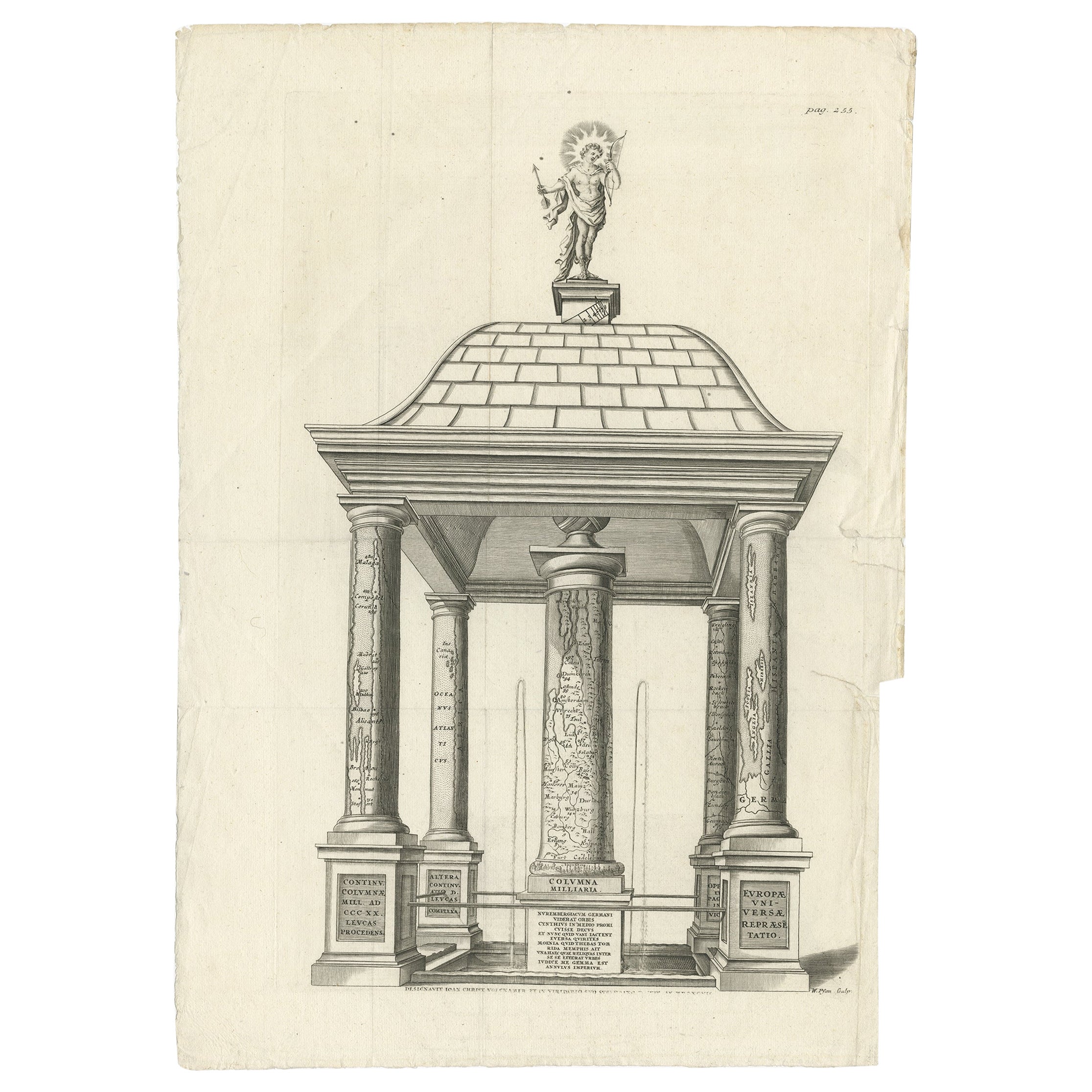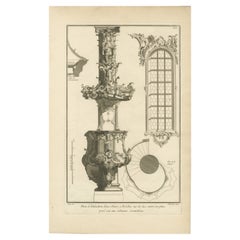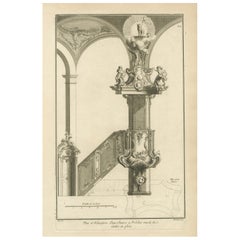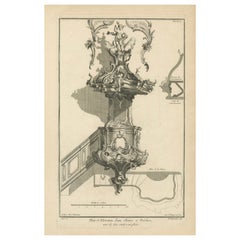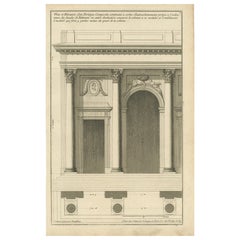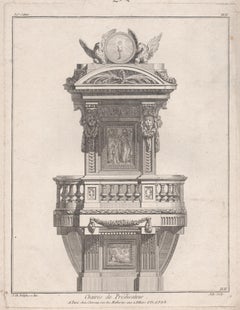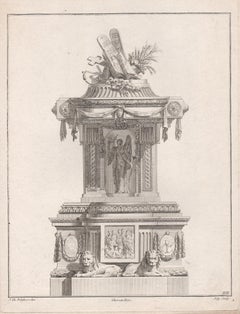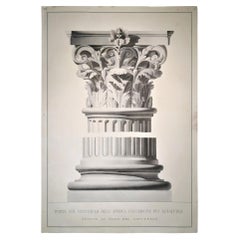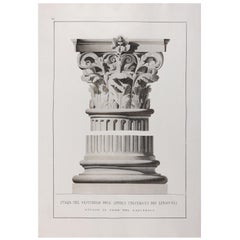Items Similar to Architectural Print of a Rococo Pulpit Elevation on a Corinthian Column, ca.1740
Want more images or videos?
Request additional images or videos from the seller
1 of 6
Architectural Print of a Rococo Pulpit Elevation on a Corinthian Column, ca.1740
$622.29
$777.8620% Off
£462.25
£577.8220% Off
€520
€65020% Off
CA$858.49
CA$1,073.1120% Off
A$943.71
A$1,179.6420% Off
CHF 495.97
CHF 619.9720% Off
MX$11,460.11
MX$14,325.1420% Off
NOK 6,187.13
NOK 7,733.9120% Off
SEK 5,861.87
SEK 7,327.3320% Off
DKK 3,958.51
DKK 4,948.1420% Off
About the Item
This is an original antique architectural design for a rococo pulpit dating approximately between 1740 and 1760.
The artist responsible for this design is Franz Xaver Habermann, and it was published by Johann Georg Hertel I in Augsburg. The design shows a richly decorated pulpit, typical of the Rococo style, which is known for its elaborate ornamentation, asymmetry, and curves. This image is one of four numbered plates related to this work. The detail in the engraving is meticulous, showcasing the elaborate aesthetic that characterized much of the European art and architecture during the mid-18th century.
Franz Xaver Habermann (1721–1796) was a German engraver and etcher who was active during the 18th century, a period marked by the Rococo style. Although not as widely known as some of his contemporaries, Habermann contributed significantly to the graphic arts during his time.
Habermann's work often featured architectural designs, such as the intricate pulpit depicted in the image you've provided. He was skilled in creating prints that detailed elaborate decorative schemes and architectural fantasies, which were popular during the Rococo period. His creations were known for their intricate details and the fluidity of their lines, capturing the lightness and ornamental excesses that characterized Rococo design.
Johann Georg Hertel I, who published Habermann's work, was part of a notable family of engravers and publishers in Augsburg, a city that was an important center for publishing in Europe at the time. The Hertel family played a significant role in disseminating artistic and architectural designs through their publications.
While specific details about Habermann’s life and training may not be as well-documented as those of major artists of his time, his surviving works suggest that he was a highly skilled engraver who had mastered the Rococo style, contributing to the spread of this aesthetic through his printed works. His designs would have influenced the tastes of the period, both within Germany and across Europe, where the appetite for such elaborate designs was significant.
More in detail about this engraving:
The text on the print is French, and it translates to English as:
"Elevation of a pulpit from the front with a full arch, placed on a Corinthian column."
This description refers to the architectural drawing of the pulpit, indicating that the design features a frontal view of the pulpit with an arch and that it is supported by a column in the Corinthian order, which is known for its ornate capitals decorated with acanthus leaves and scrolls.
In our shop we also published the other three engravings in this series and they might still be on offer as well.
- Dimensions:Height: 16.54 in (42 cm)Width: 10.44 in (26.5 cm)Depth: 0 in (0.02 mm)
- Materials and Techniques:Paper,Engraved
- Period:1740-1749
- Date of Manufacture:circa 1740
- Condition:Good, given age. Light soiling near paper edges. Light staining. Left paper edges a bit rough from binding. Very light creasing from handling. General age-related toning and/or occasional minor defects from handling. Please study scan carefully.
- Seller Location:Langweer, NL
- Reference Number:Seller: BG-13675-451stDibs: LU3054338258752
About the Seller
5.0
Recognized Seller
These prestigious sellers are industry leaders and represent the highest echelon for item quality and design.
Platinum Seller
Premium sellers with a 4.7+ rating and 24-hour response times
Established in 2009
1stDibs seller since 2017
2,636 sales on 1stDibs
Typical response time: <1 hour
- ShippingRetrieving quote...Shipping from: Langweer, Netherlands
- Return Policy
Authenticity Guarantee
In the unlikely event there’s an issue with an item’s authenticity, contact us within 1 year for a full refund. DetailsMoney-Back Guarantee
If your item is not as described, is damaged in transit, or does not arrive, contact us within 7 days for a full refund. Details24-Hour Cancellation
You have a 24-hour grace period in which to reconsider your purchase, with no questions asked.Vetted Professional Sellers
Our world-class sellers must adhere to strict standards for service and quality, maintaining the integrity of our listings.Price-Match Guarantee
If you find that a seller listed the same item for a lower price elsewhere, we’ll match it.Trusted Global Delivery
Our best-in-class carrier network provides specialized shipping options worldwide, including custom delivery.More From This Seller
View AllOld Baroque Pulpit Design with Corinthian Column and Staircase Plan, ca.1740
Located in Langweer, NL
Architectural design with the central elements depicted in the engraving: the Baroque design of the pulpit, the inclusion of a Corinthian column which suggests a classical influence, and the presence of a staircase plan indicating the approach to the pulpit.
Dating approximately between 1740 and 1760.
The artist responsible for this design is Franz Xaver Habermann, and it was published by Johann Georg Hertel I in Augsburg. The design shows a richly decorated pulpit and archway, typical of the Rococo style, which is known for its elaborate ornamentation, asymmetry, and curves. This image is one of four numbered plates related to this work. The detail in the engraving is meticulous, showcasing the elaborate aesthetic that characterized much of the European art and architecture during the mid-18th century.
Franz Xaver Habermann (1721–1796) was a German engraver and etcher who was active during the 18th century, a period marked by the Rococo style. Although not as widely known as some of his contemporaries, Habermann contributed significantly to the graphic arts during his time.
Habermann's work often featured architectural designs, such as the intricate pulpit depicted in the image you've provided. He was skilled in creating prints that detailed elaborate decorative schemes and architectural fantasies, which were popular during the Rococo period. His creations were known for their intricate details and the fluidity of their lines, capturing the lightness and ornamental excesses that characterized Rococo design.
Johann Georg Hertel I, who published Habermann's work, was part of a notable family of engravers and publishers in Augsburg, a city that was an important center for publishing in Europe at the time. The Hertel family played a significant role in disseminating artistic and architectural designs through their publications.
While specific details about Habermann’s life and training may not be as well-documented as those of major artists of his time, his surviving works suggest that he was a highly skilled engraver who had mastered the Rococo style, contributing to the spread of this aesthetic through his printed works. His designs would have influenced the tastes of the period, both within Germany and across Europe, where the appetite for such elaborate designs was significant.
More in detail about this engraving:
This engraving features a detailed representation of a Baroque-style preacher's pulpit, intricately designed and placed upon a Corinthian column, demonstrating the grandeur of religious architecture during the Baroque period. The pulpit is richly adorned with elaborate scrollwork, acanthus leaves, and possibly religious iconography, all common elements in Baroque ecclesiastical design.
A significant feature of this print is the inclusion of architectural details such as the Corinthian column base, known for its ornate capital with acanthus leaves and scrolls, which supports the pulpit above. This classical element signifies stability and order, providing a stark contrast to the exuberant decoration of the pulpit itself.
To the right of the pulpit, there's a tall, slender window filled with panes that could either be clear or stained glass, framed by an ornate window arch...
Category
Antique 1740s Prints
Materials
Paper
$622 Sale Price
20% Off
Free Shipping
Baroque Pulpit Elevation with Ornate Archway and Balustrade Engraved, ca.1740
Located in Langweer, NL
This is an original antique architectural design for a pulpit in baroque style with archway and balustrade dating approximately between 1740 and 1760.
The artist responsible for th...
Category
Antique 1740s Prints
Materials
Paper
$622 Sale Price
20% Off
Free Shipping
Original Antique Baroque Sermon Pulpit with Full Arch Elevation, circa 1740
Located in Langweer, NL
This is an original antique architectural design for a pulpit in baroque style dating approximately between 1740 and 1760.
The artist responsible for this design is Franz Xaver Hab...
Category
Antique 1740s Prints
Materials
Paper
$622 Sale Price
20% Off
Free Shipping
Antique Architecture Print of a Composite Portico by Neufforge, c.1770
Located in Langweer, NL
Antique print titled 'Plan et Elevation d'un Portique Composite (..)'. Old print showing the design of a Composite portico. This print originates from 'Recueil Élémentaire d?Architec...
Category
Antique 18th Century Prints
Materials
Paper
Monumental Design with World Map Pillar – Engraving after Volckamer, c.1780
Located in Langweer, NL
Monumental Design with World Map Pillar – Engraving after Volckamer, c.1780
This antique engraving presents a classical architectural structure, topped with a domed roof and supported by intricately adorned columns. At its center stands the so-called *Columna Milliaria*, a column believed to reference or metaphorically embody the Roman Tabula Peutingeriana – the famous ancient Roman map...
Category
Antique 18th Century Prints
Materials
Paper
Antique Print of Palazzo Chigi by De Rossi, c.1710
Located in Langweer, NL
Antique print titled 'Finestrone di mezzo che conduce nella Ringhiera (..)'. Old print of a window of Palazzo Chigi, Rome. This print originates from 'Studio d'architettura civile so...
Category
Antique 18th Century Prints
Materials
Paper
You May Also Like
French Neoclassical design for a Pulpit, engraving after Delafosse
Located in Melbourne, Victoria
Copper-line engraving. C1768.
Delafosse was a French decorative designer, engraver and architect. Apprenticed for a time to a sculptor, by 1767 he styled himself an 'architect and professor of design'. He published the first volume of his most important work, 'Nouvelle Iconologie Historique' in 1768, containing 110 plates of his designs for furniture, decorative arts and architectural...
Category
Late 18th Century French School Interior Prints
Materials
Engraving
French Neoclassical design for a Pulpit, engraving after Delafosse
Located in Melbourne, Victoria
Copper-line engraving. C1768.
Delafosse was a French decorative designer, engraver and architect. Apprenticed for a time to a sculptor, by 1767 he styled himself an 'architect and professor of design'. He published the first volume of his most important work, 'Nouvelle Iconologie Historique' in 1768, containing 110 plates of his designs for furniture, decorative arts and architectural...
Category
Late 18th Century French School Interior Prints
Materials
Engraving
Italian 19th Century Big Size Florence Architectural Hand-Colored Print
Located in Scandicci, Florence
"Porta nel Vestibolo dell'antica Università dei Lanaioli - Studio al Vero del Capitello"
A rare extra-large print, printed on engraving paper with an antique star press and watercolored by hand representing an antique capital...
Category
Antique 1840s Italian Neoclassical Prints
Materials
Paper
Italian 19th Century Big Size Florence Architectural Hand-Coloured Print
Located in Scandicci, Florence
A rare extra-large print, printed on engraving paper with an antique star press and watercoloured by hand representing an antique capital. The capital'...
Category
Antique 1840s Italian Neoclassical Prints
Materials
Paper
Ancient Roman Decorations - Etching G. Casanova - 18th Century
By Giacomo Casanova
Located in Roma, IT
Ancient Roman Decorations is an etching on paper realized by Giacomo Casanova in the 18th Century.
Signed on the plate.
Good conditions with some foxing and folding and a small c...
Category
Late 18th Century Old Masters Figurative Prints
Materials
Etching
Neoclassical Etching of Roman Candelabra by Giovanni Battista Piranesi
By Giovanni Battista Piranesi
Located in Stamford, CT
Neoclassical Etching of three ancient Roman candelabra by Giovanni Battista Piranesi (1720-1778) originally published in 1778 as Vasi, candelabri...
Category
Antique Late 18th Century Italian Neoclassical Prints
Materials
Paper
More Ways To Browse
Rococo Architecture
19th Century Damask Chairs
4 Panel Asian Silk Screens
4 Panel Japanese Wall Art
70s Mexican
Adoration Shepherds
African Ebony Wood
Air Du Temps Nina Ricci
Alfredo Barbini Bird
American Federal Chest
Ancient Chinese Ceramics
Antique Bell Stand
Antique Bombay Chest
Antique Bombay Chests
Antique Chinese Hat Stand
Antique Chinese Roof Tile
Antique Copper Scale
Antique Drop Pull Handles
